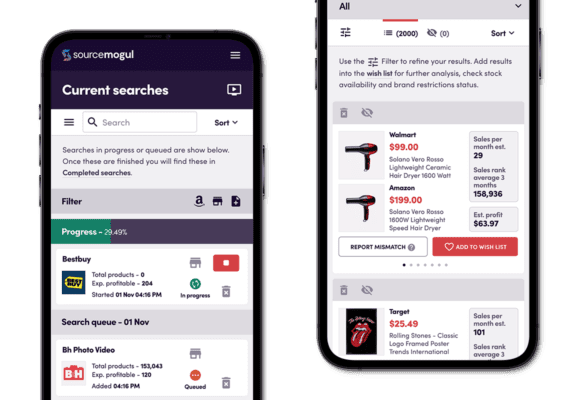We get many queires asking us “what is online arbitrage?” This guide will help new sellers to understand this simple concept.

Online Arbitrage – What you should know
What is online arbitrage?
Although not a massively well-known concept, online arbitrage has been around since the early 2000’s. Ever since Amazon and eBay made it possible to independently sell goods to an unlimited national or international client base over the internet, people have been applying the economic practice of arbitrage to the online world from the comfort of their own homes.
Theoretically, it’s fairly simple. Every month, a large retailer will get a shipment of a set number of a particular product, such as a coffee machine, based on the average amount that they sell. However, even if the coffee machine is popular, it doesn’t guarantee they’re going to sell every single one. Nonetheless, they’ll continue to receive the same amount of coffee machines each month, which will create excess stock that needs to be cleared. If a product is discounted, it doesn’t necessarily mean that it’s a bad product or that people aren’t buying it, just that the retailer has too many and they need to make room.
This is where retail arbitrage comes in. Provided there are no ‘brand restrictions‘ on the coffee machine, there is nothing stopping you purchasing it at its discounted price, listing it on Amazon or another resale site for what it’s originally worth and pocketing a potentially substantial profit.
It almost sounds too easy, doesn’t it? The truth is, it all comes down to good judgement. It’s up to you to pick what products are going to make you the biggest profit. This might sound similar to thrifting or ordinary reselling, but it’s a lot more sophisticated. When you thrift, you’re buying second-hand products, thereby decreasing their value. You may be getting it for less than it was originally worth, but this also prevents you from selling it at its original price. It all depends how much someone is willing to pay for it. With retail arbitrage, you’re purchasing brand new stock at a lower price, meaning that you can still sell it at its original value.
What’s the difference between retail arbitrage and online arbitrage?
As far as arbitrage is concerned, the same economic principle applies to every form: you purchase a product at a lowered price and resell it for what it’s worth in order to generate a profit. However, different subcategories of retail arbitrage have emerged, defined by the method of sourcing items for resale.
- In retail arbitrage, items are sourced by going in-person to a bricks-and-mortar shop, whether an independent retailer or a branch of a large franchise.
- In online arbitrage, items are sourced via a store’s online presence.
In both cases, products are usually re-sold online by the arbitrageur in order to appeal to a wide audience and generate maximum profit.
How does it work?
The most popular website for conducting retail or online arbitrage is Amazon. You can also use eBay or a number of other websites, but the advantage of Amazon is the lack of hassle. Whereas most resale websites require you to label, package and organise delivery of your items with the customer, often incurring additional costs, Amazon can cover this for you. Once you’ve sent your product to the warehouse, all you need to do is wait for it to sell.
You can set up an Amazon FBA (Fulfilled by Amazon) Seller account for free if you’re planning to sell fewer than 40 items a month. If your business really starts to take off and you wind up selling more than this, the profit you’ll be making will likely cover the £39.99 a month it takes to upgrade. Having said that, under 40 items is definitely enough to considerably supplement your income.
Sourcing the right products to maximise profit will make up the bulk of your work as an amateur arbitrageur. Keep an eye out for discounted products and check what they’re selling for on Amazon. Bear in mind that you’ll need to pay for shipping and Amazon fees, which are relative to the size of the item. The most common rule of thumb is to look for items that you can sell for triple what you pay for them, accounting for fees and giving yourself a ROI (return on investment) of at least 100%, meaning that your profit is equal to what you originally paid for the item (after Amazon’s fees).
Who is it for?
One of the major advantages, and key appeals, of retail arbitrage is that you don’t need to be business-savvy to do it. There are no compulsory courses or books you necessarily have to invest in to get started. Having a good eye for what’s going to sell helps a lot, but there is even software that can make that part of the process easier.
The entry and startup costs for retail arbitrage are also relatively low. Your Amazon FBA Seller account will remain free for as long as you stay under the 40 items a month limit. The biggest expense will be setting aside a sufficient budget to invest in your first few products, so it’s not recommended for those who don’t have any disposable income to begin with. No matter how simple online arbitrage can be, it’s important to remember that you’re investing your own income.
There are plenty of get-rich-quick schemes out there, but retail or online arbitrage is a realistic and pragmatic alternative. While it’s certainly possible to turn retail arbitrage into a lucrative full-time occupation, it’s not a case of either becoming a millionaire or going broke. The earning potential remains endless, but you can build it to suit your needs. Most people use retail arbitrage to comfortably supplement their income. It all depends on how good you are at spotting and taking advantage of a good deal.
How SourceMogul can help
If you’re interested in getting started with online arbitrage, SourceMogul’s software can help you navigate a seemingly unending choice of products and narrow it down to what works. We have a large database of over 100 retailers, and quickly growing, and we keep on top of any restrictions, limiting the possibility of accidentally purchasing counterfeit products or reselling a restricted brand. For more information on this subject, read about brand restrictions here. We also calculate your ROI for you, as well as tracking the popularity of a given product, maximising your earning potential and saving you valuable time.
If you want to reduce the time it takes to source profitable products for Amazon resale – get started today with a 7 day free trial and find out how SourceMogul can help you to grow a protibale business!
More strategy
-

6 steps to becoming an Amazon seller. No experience needed.
Becoming a successful Amazon seller is easy - the Amazon brand and logo represents…
-

Top tips for success from a new Amazon seller
We've compiled a list of the top tips for new sellers, gathered from a…
-

How to get ungated on Amazon – your guide to Amazon restricted categories
If you’re looking to expand your online arbitrage business, you might find yourself tempted…
-

How to prepare for Amazon Q4 trading
Every year the holiday season seems to come around a little earlier. As an…




